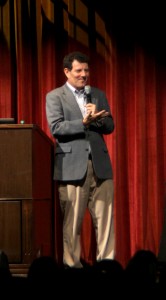New York Times columnist urges activism abroad
Two-time Pulitzer Prize winner and renowned global health journalist Nicholas Kristof discussed his push for gender equality and his most recent book at a speaker series hosted by the USC Spectrum, the Program Board Speakers Committee and the USC Institute for Global Health at the Ronald Tutor Campus Center on Monday.

Columnist · Students filled the Ronald Tutor Campus Center ballroom on Monday to hear Nicholas Kristof discuss his work as an activist. – Joseph Chen | Daily Trojan
Kristof’s 2009 book Half the Sky: Turning Oppression into Opportunity for Women Worldwide was inspired by his efforts to improve the lives of women around the world, especially in parts of Africa and Asia. In the book, Kristof and co-author Sheryl WuDunn focus on women’s issues, such as sex trafficking, maternal mortality and women’s right to education — the latter of which, according to Kristof, could be integral to gender equality.
“Education really is the best way of bringing about change,” Kristof said. “One of the greatest ways to bring about change, for example, is bringing television to those people in villages with very traditional attitudes. Six months of [Western] television in a village was equivalent to four years of education. It was really profound.”
Kristof shared anecdotes about his experiences reporting abroad, including a story about Dei Manju, a young girl living in the Hubei province of China. Kristof said Manju was never supposed to go to school. Like many other Chinese girls, she was never afforded that privilege because some Chinese parents are reluctant to invest in their daughters’ educations. However, after Kristof wrote about her in his New York Times column, donations allowed for her to graduate from high school and eventually become an accountant — proving Kristof’s theory that education could truly be essential to gender equality.
“These girls that would have otherwise have been working in the rice paddies ended up being able to get jobs,” Kristof said. “And it created this virtuous spiral of development — so that after 22 years, this village is so much better off than the others.”
During the event, Kristof said he once purchased two Cambodian prostitutes from a brothel and freed them from sex slavery, an issue he said was “high on his agenda.”
In addition to the plights of women in foreign nations, Kristof said there are large gender equality problems in the United States, especially with the issue of sex trafficking.
“We also have to recognize that while trafficking tends to be worse in other countries, we have a huge problem here,” Kristof said. “And we don’t have the moral ground to reject what other countries are doing when we are doing the same thing here. We think about sex trafficking as foreign women who are being smuggled into the U.S., but I think the worst part of it is the domestic side of it.”
Kristof said one of his most important goals is to motivate college students to immerse themselves in social work abroad, which he argues is crucial to a well-rounded education.
“It’s so important to get students out of their comfort zones,” Kristof said. “One way of doing that is to go abroad — but if you go with other students, you might not necessarily be getting out of your comfort zone … It is so important as a part of your education to immerse yourself for a time in a part of the world that you wouldn’t otherwise encounter.”
Many students at the event took Kristof’s advice to heart. Bo Lee, a junior majoring in international relations, said hearing about Kristof’s work will inspire her when she studies abroad next semester in Cape Town, South Africa.
“Listening to what Mr. Kristof said about going out of your comfort zone to make a difference really struck me,” Lee said. “It’s something that I’ll remember when I’m in a foreign country that has inequality — something that will encourage me to try to change the world.”
